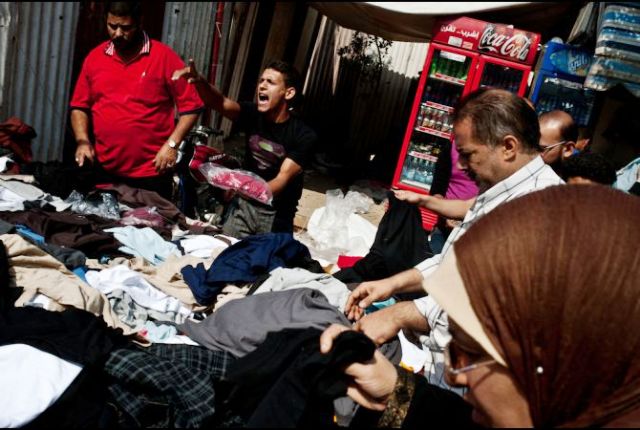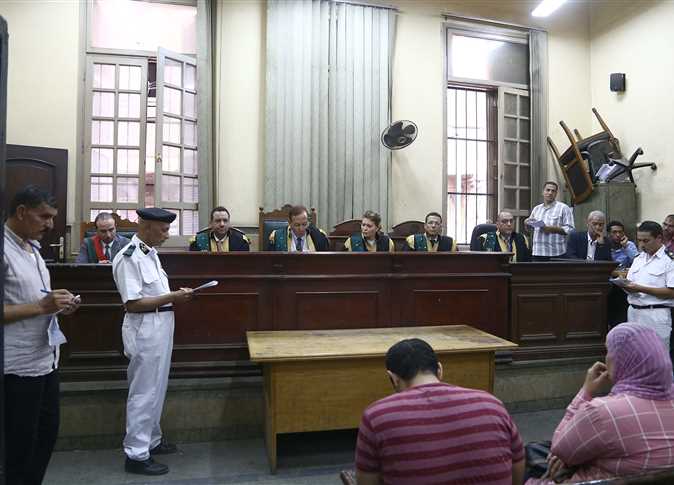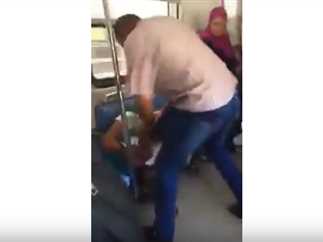
Anxious and worried are how the Azbakeya booksellers currently feel, after the government has decided to move their book stalls for the fifth time. They were first moved in 1990 to the Demerdash district, when the state decided to build a multistory car park on the original site of the Khedivial Opera House. They were later put in front of the Cairo Puppet Theater when the government embarked on its restoration project of the medieval historic wall of Cairo, before being moved twice again — to the area behind the Attaba telephone center and then to their current location — to make way for the construction of the second and third metro lines, respectively.
The most recent move was in 2009, and along with the booksellers, the Emad al-Islam mosque and its extensive facilities were relocated. The mosque currently occupies a "temporary" tin-roofed area, as its sign emphasizes, but the five-story service complex that included a clinic, school, factory, computer center, cafeteria and showroom in which they sold their products was demolished for sake of the third metro line. Now the mosque is seeking to rebuild and expand its many facilities, and the neighboring used books market seems like an ideal spot for the venture, especially as the government has agreed to move the booksellers.
Alaa Abdel Haq, one of the Azbakeya booksellers, accused the government of mistreating one of the city's cultural and historic icons. “We represent one of Egypt's most precious heritages of modern times. People come to visit us from all over the world looking for our old and rare books, hoping that they will find a great place where Arabic literature pioneers were raised, but they come to find the wall surrounded by street vendors and piles of rubbish," he told Egypt Independent. "We must be treated according to our historical and cultural value.”
Abdel Haq suspects that the motives behind the move are business driven. “The mosque is still there and people pray,” he says, adding that now it seems to want to secure its business interests, namely the cafeteria, factory and school.
Sheikh Tarek Nasr, the chairman of the Emad al-Islam service complex, does not deny it, explaining that it has suffered from limited funds since the complex was demolished four years ago, and that it supports 1,200 poor families through charitable activities.
Haj Harby Mohassab, one of the oldest and most respected booksellers at the Azbakeya wall, argues that there is some kind of deal between the mosque's administration and officials at the governorate. "They are trying to expedite the move so we cannot take action against the decision."
"But we will never move until we get a place that takes three issues into consideration: aesthetics, accessibility to the area as a book market, and security,” he said.
The government paid LE 6.8 million to the Ministry of Endowments for the restoration of the service complex after the digging process finished, but other technical issues were raised when the mosque's administration tried to rebuild it. “When we tried to start constructing the building, we found that the allocated land cannot be dug because the metro tunnel lies underneath. This means that we had been fooled,” says Nasr. That’s when Nasr asked the authorities to allow them to rebuild the complex where the bookshops currently lie, which means the relocation of the Azbakeya book market.
The repeated moves were not the largest problem the booksellers have faced over the past two decades. They have also been surrounded by street vendors that limit access to the market. This crowdedness also prevents them from moving books into the market. And the street's lighting makes sifting through the books a cumbersome task for book lovers.
Still, the Azbakeya booksellers refuse to relocate until they are allocated a well-planned spot. “We are tired of random decisions that control the fate of our families,” says Abdel Haq.
The Azbakeya book market comprises 36 bookstores each employing at least two workers, and so such decisions affect the livelihood of around 100 families, according to Abdel Haq.
Among the many objections to the move is that the new spot they have been allocated by the government is locked behind three huge buildings — the Attaba Telephone Center, the Traffic Department, and the police station. The only entrance and exit to the area is blocked most of the time by street vendors and their merchandise.
"It's insane to have a whole market without two or three emergency exits — this could easily cause a disaster," said bookseller Atef Abdul-Aziz.
The government does not want to create more exits for the new spot for fear that street vendors will occupy it, says Sheikh Nasr. But the only entrance has already been seized by vendors who don't want to move elsewhere. "It's our children's livelihood that we are talking about here. If the government wants to move us [for the sake of the booksellers], they must find us a good spot," one street vendor explained.
Ideally, the Azbakeya booksellers want to go back to their original spot by the historic Azbakeya gardens, but even that has been occupied street vendors, says Haj Mohassab.




